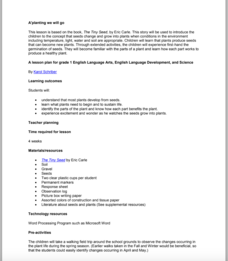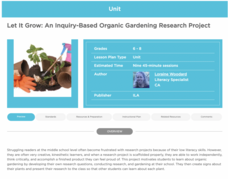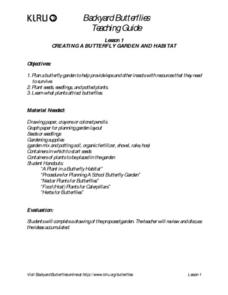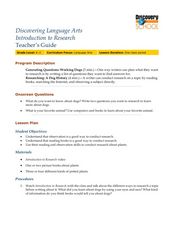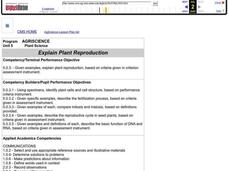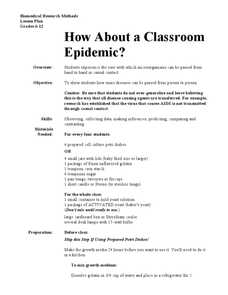Nuffield Foundation
Observing Earthworm Locomotion
One acre of land can contain more than a million earthworms. Scholars collect earthworms to observe their movements. Once placed on paper, the sound of movement often fascinates pupils. When placed on glass, the earthworm is unable to...
Nuffield Foundation
Observing Water Moving Through Plants
We know plants assist in the water cycle, but how do plants get water from the ground into the air? Through a series of demonstrations or labs, scholars observe the movement of water through plants. They microscopically view the cells...
Curated OER
A'planting We will Go
Germination is an amazing process that results in amazing things. The book The Tiny Seed is the inspiration for a set of activities that will help build early literacy, observation, language, and writing skills. The class observes how...
Curated OER
"Lettuce" Learn About the Water Cycle
Young scientists investigate the water cycle through a lettuce seed experiment. For this experiment, learners plant lettuce seeds inside of a ziplock bag in order to create a small greenhouse. They observe condensation and precipitation,...
Curated OER
Peat Pots
Young scholars place a peat pot in water to observe and calculate the rate of capillarity in a model of a soil. This task assesses students' abilities to make simple observations, collect, record, and represent data, use a data table to...
Curated OER
Observing the Pumpkin Cycle
Students observe and listen to nonfiction books about the life cycle of pumpkins. They practice early reading skills in a shared reading related to pumpkins. They observe the life cycle of a pumpkin including growth and decay.
PBS
Curious George: Water Drops
A short video features Curious George playing with pots filled with colored water. Scholars then take to colored water with eye droppers and observation skills. They examine what happens to water drops when dropped from different...
ReadWriteThink
Let It Grow: An Inquiry-Based Organic Gardening Research Project
How does your garden grow? An inquiry-based, organic gardening unit asks young scientists to research a vegetable or flower, create an environment for it, and then plant and tend to the seedling. Gardeners develop their own research...
Curated OER
Beginning Research
Students view and discuss a video segment to discover the importance of researching a topic before writing about it. They use the topic of plants to research information by looking through picture books and observing potted plants in...
PBS
Creating a Butterfly Garden and Habitat
This complete set of instructions for creating your very own butterfly garden and habitat is so cool! With some seeds and the handy resources in this activity, you and your class will be able to determine which type of habitat is best...
Curated OER
Nature: Planting Terrariums
Students observe and experiment using a terrarium. In this scientific lesson plan, students build a nature terrarium. Students then observe their terrarium over a period of time to discover what makes the plants grow. A science...
Curated OER
Archaeology: Digging in the Classroom
Learners explore how an archaeologist works and makes discoveries. In this archaeology lesson, students participate in a simulation in which they excavate broken pottery. Learners use measurement, geometry, and observation skills during...
Kenan Fellows
Sustainability: Learning for a Lifetime – Soil
Do great gardeners really have green thumbs—or just really great soil? Environmental scholars discover what makes Earth's soil and soil quality so important through research and experimentation. Learners also develop an understanding of...
Curated OER
What is Soil?
Learners examine soil. In this earth science activity, students define and describe weathering and erosion as it relates to soil. Learners compare and contrast potting soil with forest soil and complete a science observation worksheet.
Curated OER
All About Seeds!
How do fruits relate to flowers and seeds? Identify the seeds and their purpose with a coloring activity for kindergartners. Once they color the seeds of apples, bananas, and peas (among others), kids get hands-on experience with bean...
Curated OER
Discovering Language Arts: Introduction to Research
Students research plants. For this researching lesson, students watch a video about the different ways to research a topic before writing about it. Students use the information gathered in this video to learn more about plants. Students...
American Farm Bureau Foundation for Agriculture
My Miniature Greenhouse!
Here is an activity that will peak your super scientists' interest and knowledge of greenhouse gardening. Green thumbs flourish when they build, prepare, take care of, and observe their seedlings inside a miniature greenhouse. With...
Curated OER
Biomes and Plant Growth
Seventh graders design four biomes models and plant three types of seeds in them to observe growth. In groups for each type of biome, they predict the seeds' growth in each of the settings. Students follow the conditions on a biome chart...
Curated OER
Plant Reproduction
Students plant seeds in order to investigate and explore the questions: "How do seed companies develop varieties of plants?" and "What is the ideal plant?" Students will study related vocabulary and sketch seeds as they emerge. Students...
Curated OER
How About a Classroom Epidemic?
Have individuals wash their hands with soap and water, give one of them a yeast-covered piece of candy, and then have him shake hands with the person next to him. Handshakes continue down the line until everyone in the class has had...
Newspaper Association of America
Cereal Bowl Science and Other Investigations with the Newspaper
What do cereal, fog, and space shuttles have to do with newspapers? A collection of science investigations encourage critical thinking using connections to the various parts of the newspaper. Activities range from building origami seed...
Curated OER
Forming a Hypothesis
In this hypothesis worksheet, students read about how to form a hypothesis and how to collect observations. Students go through the 4 steps of forming a hypothesis.
Curated OER
Fun with Flowers
Students make observations of flowers. In this life science lesson, students look at flowers, then draw and color their favorite flowers. Lesson includes extension activities.
Curated OER
Drawing From Nature
Students observe similarities and differences of natural objects. In this observation instructional activity, students use a magnifying glass to identify the details of objects.


